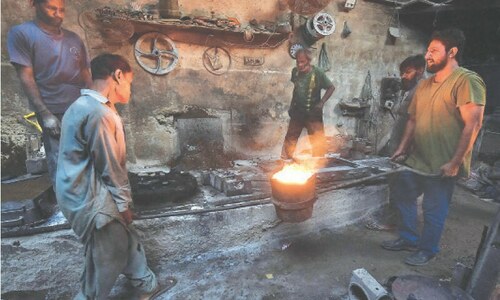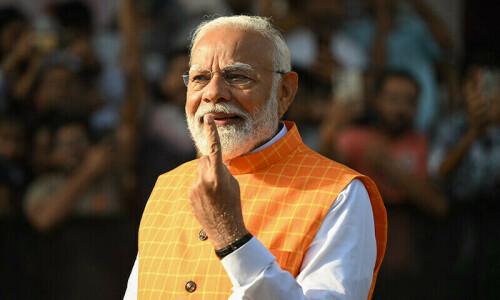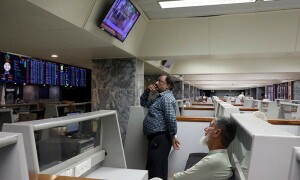
SOME scholars believe that readability is a definite no-no for research works, or, at least, that is what their research work shows, though readability is something all the more needed in research works.
Jameel Jalibi is one of the research scholars of Urdu whose prose makes reading a pleasure, quite unlike some of our scholars whose research works and critical writing are a time-tested remedy for chronic insomnia.
Muhammad Hamza Farooqi’s new book Mehr-i-Darakhshan captures the essence of the life and works of Ghulam Rasool Mehr and it shows that Farooqi too belongs to the order of writers who believe in readability. His prose is readable and at times delightful.
Ghulam Rasool Mehr (1895-1971) was a polymath: he was a historian, journalist, researcher, Ghalib scholar, politician, encyclopedist, translator, editor and poet. Mehr knew many languages and wrote some 50 books on different subjects.
With his encyclopedic knowledge and ability to write almost anything at will, Mehr not only penned some remarkable works of history and literature but he was also a part of some historic delegations and committees at critical junctures in the history of the subcontinent. Mehr was a member of the delegation sent to Hijaz (Arabia) to investigate the news that said Ibn-i-Saud’s forces had fired shots at the mausoleum of Prophet Muhammad (PBUH). Mehr was also a part of the committee formed to chalk out the details of what was at that time referred to as “Pakistan scheme”.
Though a couple of dissertations had been written on Mehr before, hardly any could really capture the genius that Mehr was. But luckily Muhammad Hamza Farooqi, who seems to be much inspired by the multi-talented personality, has written four books on Mehr. Mehr-i-Darakhshan is his new book on Ghulam Rasool Mehr. Published by Majlis-i-Taraqqi-i-Adab, Lahore, the book is packed with rare material brought to light for the first time. Given the details covered in Farooqi’s books on Mehr, it would be much difficult for future researchers to add anything new to what is now known about him.
What has made the book an authentic research work is the source material cited, some of it very rare and unpublished. Farooqi had access to it through the heirs of Mehr, especially his sons Amjad Saleem Alavi and Farooq Arshad Shaheen. The material included Mehr’s letters and his autobiography describing his life, written between 1919 and 1926. Farooqi has quoted extensively from many rare published sources too – such as hundreds of issues of Inqilab and Zamindar, the newspapers that Mehr edited at one time or the other. With a keen eye on the history of the subcontinent and the political milieu that Mehr came from, Farooqi has taken full advantage of his vast and deep study, making the book an authentic peep into a certain era of the subcontinent’s history. The book covers not only Mehr’s life, but it gives glimpses of the subcontinent’s history and social life as well.
A veteran research scholar known for his research on Allama Iqbal and Mehr, Muhammad Hamza Farooqi is a Karachi-based creative writer and a globetrotter, too: he has written essays, pen-sketches and travelogues in a lighter vein. Equally at ease both with research and creative work, Farooqi shows a certain flair while writing even on historical issues which gives it a readability that has become quite rare in research works these days.
“Mehr was a fountain of knowledge and many scholars and students used to write to him to get guidance on different matters. Mehr would reply and among those who were closer to him, would get detailed letters. In the letters to his dear ones he would describe his life, his personal matters and events sincerely and truthfully, even the matters that are usually not narrated to everyone,” writes Farooqi in his intro to the book. “These letters, therefore, have become an important and reliable source on Mehr’s life,” adds the writer.
This 480-page scholarly work has 12 chapters and a select bibliography. The first five chapters deal with Mehr’s life events, his childhood, education, intellectual pursuits, pastimes and his means of earning livelihood. The sixth and seventh chapters show how two giants of the day, Iqbal and Abul Kalam Azad, impressed and inspired Mehr. In the eighth and ninth chapters the author discusses in detail Mehr’s political and journalistic achievements, especially his attachment with Zamindar and Inqilab. Mehr’s works are critically evaluated in the 10th chapter. As if this was not enough, Farooqi has discussed Mehr’s poetry and his travels in the last two chapters.
Apparently, the title of the book sounds poetic and has a double entendre, as Mehr-i-Darakhshan literally means “the brightly shining sun” as well as “the bright Mehr”, but it is justified as it is a definitive tome on Ghulam Rasool Mehr, which clears the mist with its bright sunshine. For example, Mehr’s date of birth is commonly quoted as April 13, 1893. But Mehr himself had reckoned it, as quoted by Farooqi, to be April 18, 1895. And we can trust both Mehr and Farooqi. Interestingly, the title has been borrowed from the lead of Mehr’s obituary published in Chataan, Lahore. It read: “Ilm-o-qalam ka mehr-i-darakhshan ghuroob ho gaya.” (The bright sun of pen and knowledge sets).
Every sun has to set, as goes the Arabic proverb. And the sun finally set forever on Ghulam Rasool Mehr in Lahore on Nov 16, 1971.
Published in Dawn, August 1st, 2016











































